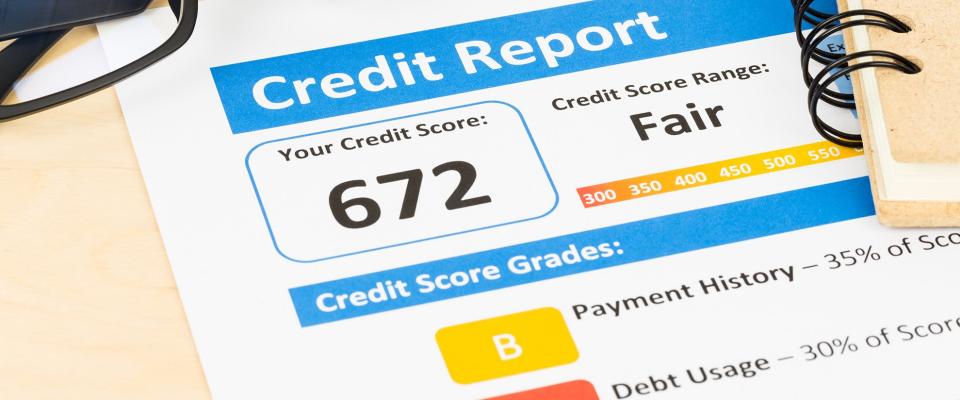This Is How You Build Good Credit

Nearly every major event in your financial life involves a credit check. Signing up for a new cellphone contract? Credit check. Renting a new apartment or applying for a mortgage? Credit check. Opening a new credit card? You guessed it.
Your three-digit credit score is the most telling financial information a lender has access to, because it's based on your repayment history.
If you pay your bills on time and in full, you'll have a good credit score, which will help you get loans — and on good terms. A bad credit score, if you have late payments or other blemishes on your credit, will get you nowhere.
Keep reading to find out how to establish, maintain and raise your credit score high enough to be able to reach your financial goals.
Learn your credit score

Casper1774 Studio/Shutterstock
If you've been using credit for a while, then you'll want to find out what your credit score is right away. That way you can determine if you're already doing well or if you need to work on improving your score.
Your credit score is a simple number on a scale between 300 to 850. Every lender has its own standard for what a "good" score means, but often, credit score ratings look like this:
300-629: Bad credit
630-689: Fair credit, also called average credit
690-719: Good credit
720 and up: Excellent credit
To find out your score, once a year you can request a free copy of your credit report from each of the three main credit reporting agencies, Equifax, Experian, and TransUnion. Just go to AnnualCreditReport.com.
You also can access a copy of your credit score within 60 days if you've been denied credit or if you're on welfare, unemployed, or if your report has any mistakes in it.
This last point is very important: Your credit report might have errors or inconsistencies in it that are lowering your score. That means you MUST check your credit report once a year and read it through carefully to make sure everything's aboveboard.
If you find an error, ask for a dispute form from the agency with the mistake within 30 days of getting your report. Get it done! Your score will thank you.
Easy ways to raise your credit score

Fisher Photostudio/Shutterstock
Strangely enough, having no credit is just as bad as having bad credit, because lenders simply have no idea what kind of spender or borrower you are — and they will refuse to loan you money. So, the first step to having a good credit score is to establish some credit.
When you're building your credit history from scratch, your bank might offer an opportunity to get a credit card with a low spending limit based on what the bank knows about your income and banking habits from your existing account.
Another option is to apply for a secured credit card, which is backed by money that you deposit before you begin using it. The deposit is usually in the same amount as the limit on the card. This card is temporary, to help you start building credit.
Your secured credit card might have a limit of $500. So, first you give the bank $500 to hold. Outside of requiring a deposit, this card functions like any regular credit card. The difference is that the bank has the deposit as collateral if you fail to pay your bill.
You get the deposit back when you close the account. After making regular payments on the card for a few months to a year, you will have enough credit to apply for an unsecured (normal) credit card with better benefits and a higher spending limit.
Another option to building credit is to become an authorized user on someone else's credit card account. Ask a family member or significant other to add you as an authorized user on one of their cards. The primary cardholder is responsible to cover your bill if you fail to pay it.
Have a clear conversation beforehand and make a serious verbal commitment to pay your card off, even though you're legally not obligated to do so.
Then, check with the card issuer to make sure your authorized credit use is reported to the major credit bureau. Otherwise, all your hard work to build good credit won't even get recorded.
Easy ways to improve your credit score

Cheryl Savan/Shutterstock
No matter what your score is right now, there are some super easy ways to start improving it, right away.
Make all of your payments on time. This includes fully paying your credit bill (yes, all of it!), your utilities, and any rental bills. Any bills you don't pay might be reported and will immediately begin to hurt your credit score
Keep your "credit utilization" low. Your credit utilization is the percentage of your available credit that you're using. For example, if you have one credit card with a $1,000 limit and you're carrying a $500 balance, then you're at 50% credit utilization.
Try to keep your credit usage at 30% or less, and don't ever let your credit cards be maxed out. This is guaranteed to cause you problems with paying your bill on time, and will hurt your credit score.
Open a savings account and save up for your bigger purchases, so you don't have to make them on credit. You can always get a new TV/pants/gaming system/shoes next month, when you have more money in the bank.
Avoid having too many accounts open at the same time. Part of your credit score depends on the "age" of your accounts, so having too many new accounts lowers the age of your credit history. Having a longer or "older" history gives you more clout with lenders and raises your credit score.
Keep your accounts open as long as possible to make the most of your repayment history and credit utilization. Try to do this unless you have an unused card with an annual fee that will be eating away at your money.
Keep tabs on your credit report and check it every year to make sure there are no errors.
Making the effort to create, build, and maintain a good credit score will allow you to reach all the great life milestones you desire. That's definitely worth the effort of playing the credit game right!
